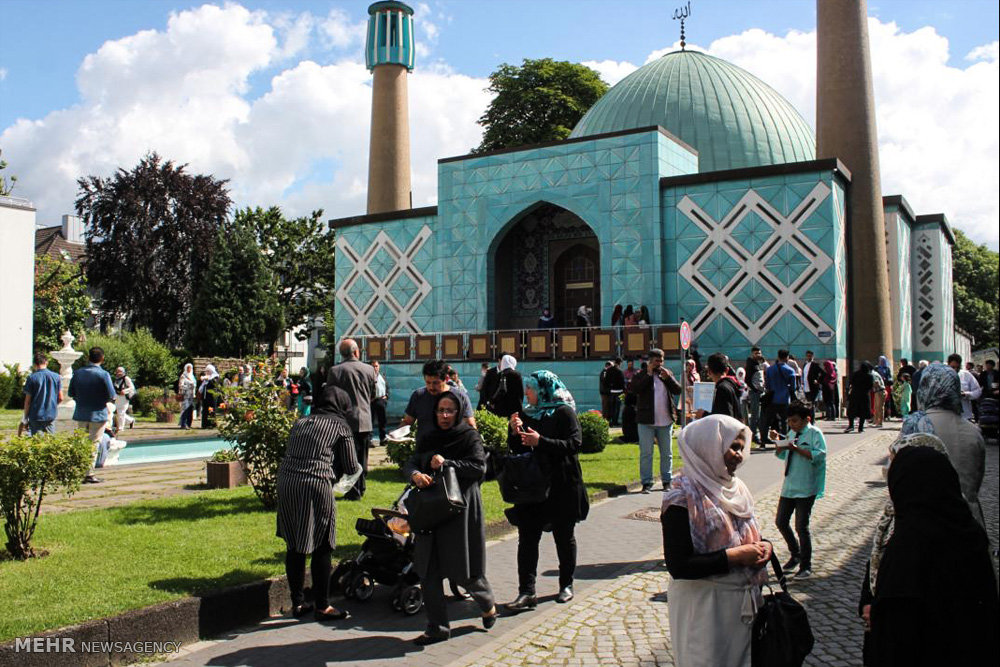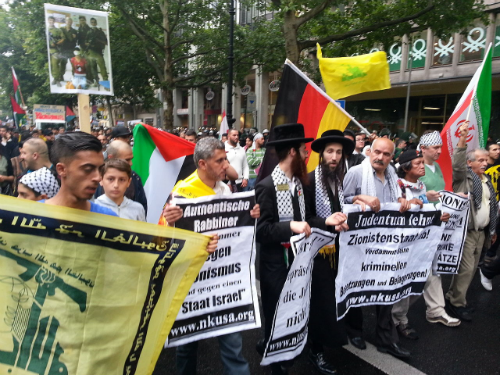Germany has emerged as the primary hub of Hezbollah and pro-Iranian activism on the European continent. Hezbollah’s activities in Germany date back to the 1980s, when the group established a presence among Shi’a communities fleeing the Lebanese civil war. In 1992, a Hezbollah cell carried out one of the organization’s most “daring and public assassinations” at the Mykonos Restaurant in Berlin, targeting the head of Iran’s primary Kurdish opposition movement. The Mykonos assassination plot was ordered and directed by the highest echelons of the Iranian government by a body called the Committee for Special Operations, “which included President Rafsanjani, Minister of Intelligence Fallahian, Foreign Minister Ali Akbar Velayati, … and, most significantly, Supreme Leader Ali Khamenei.” In 1997, Steven Smyrek, a German convert recruited by Hezbollah and trained in Lebanon for a suicide bombing mission, was arrested upon arrival at Tel Aviv’s Ben Gurion airport before he could carry out an attack on Israeli civilians.
Hezbollah has generally refrained from engaging in terrorist activities in Germany since those incidents, instead primarily using Germany as a safe haven and for spreading anti-Israeli and anti-Semitic propaganda. A 2016 report from the domestic intelligence service in Berlin states that the Hezbollah leadership has explicitly given the directive not to engage in high-profile activities in Germany. Nevertheless, a 2016 federal report by the Office for the Protection of the Constitution, Germany’s domestic intelligence agency, argues that Hezbollah uses third countries to plan terrorist attacks against Israel. Concerns about Iranian or Iran-backed activities in third countries were substantiated by an Iranian spy probe in 2017 and subsequent raids against suspected Iranian agents in the beginning of 2018 in Germany.
Iran is increasingly engaged in espionage activities on German individuals. In March 2017, it was reported that the Quds Force intelligence hired a Pakistani student known as Syed Mustafa H. to gather information on pro-Israeli individuals and institutions. The student was asked to surveil former MP Reinhold Robbe, who previously headed the German-Israeli parliamentary group and served as President of the German-Israeli Society. Security authorities suspect that information was gathered for potential retaliatory measures against Israel-friendly individuals in case Israel launched air strikes on Iranian nuclear facilities. Following this incident, police conducted a series of raids linked to 10 other Iranian spy suspects, but no arrests were made. The spy probe prompted pro-Israeli and Iran-critical voices to call for tougher actions against Tehran, with some suggesting that Germany expel its Iranian ambassador, ramp up its counter-intelligence, and designate the IRGC and Hezbollah as terrorist organizations. In response to the incident, the German Foreign Ministry summoned Iranian ambassador Ali Majedi in December 2017 to communicate that these kinds of violations are unacceptable.
Hezbollah maintains a robust presence in Germany. According to an October 2017 report of the Federal Office of the Protection of the Constitution, Germany’s domestic intelligence agency, there are 950 active Hezbollah members in Germany, classified as belonging to the organization’s “political wing,” a number which has remained steady for over a decade. The Hezbollah supporters regularly meet at Iran-backed mosques and Islamic community centers around the country. There are believed to be around 30 such institutions in this pro-Iranian network, including the Imam Mahdi Centre in Münster-Hiltrup, the Imam Reza mosque in Berlin, and the Imam Ali Mosque in Hamburg. The ongoing Middle Eastern refugee crisis further compounds the security risk posed to Germany by Hezbollah. The 2017 intelligence report states that, “Since mid-2015 there are increased indications of fighters from Shi’ite militias entering Germany as legal refugees.”
Pro-Iranian activities in Germany center largely around the Islamic Center of Hamburg (Islamisches Zentrum Hamburg, or IZH), an umbrella institution which plays a financial and organizational role in the operation of Shi’a associations around Germany. The IZH seeks to promote the Islamic Revolution in Germany via “brochures, events, prayers, rallies, and other activities. According to Germany’s intelligence agency, “Towards the outside world, the IZH acts as a mere religious organization that does not include political activities in its direct field of work. … In reality however, IZH spreads the Shiite teachings of Iranian brand, as one of the most active centers of Iranian propaganda in Europe. Its actual task is the ‘subtle propagation’ of an Islamic theocratic State after Iranian example.” German intelligence agencies allege the IZH is directly controlled by Tehran. Underscoring the IZH’s linkages to Iran, the IZH’s imam and director since 2002 is Ayatollah Reza Ramezani, who German intelligence has labelled Supreme Leader Khamenei’s deputy in Europe and who in 2006 was elected to Iran’s Assembly of Experts, the deliberative body tasked with electing and overseeing the Supreme Leader.
Each year, Hezbollah members and supporters gather publicly in Berlin for the annual Al Quds Day march, a global initiative of the Iranian regime initiated by Ayatollah Khomeini dedicated to Israel’s destruction. The IZH is involved in the organization of the march, and funds buses of pro- Hezbollah, pro-Iranian regime activists to the event from the Imam Ali mosque in Hamburg, which the IZH operates. Prominent displays of Hezbollah flags and posters of Shi’a and “resistance axis” leaders, such as Ayatollahs Khomeini and Khamenei, Hassan Nasrallah, and Bashar al-Assad have been a fixture at the Quds Day rallies, although in 2016, the Berlin State Senate agreed to ban Hezbollah flags at the gathering going forward.
Despite the IZH’s Iranian and Hezbollah’s links, federal and municipal bodies have played a role in legitimizing the organization in Germany. In November 2012, Hamburg entered into a partnership treaty with the regional shura, an umbrella council of Islamic associations which includes the IZH, making the IZH a partner of the city of Hamburg. In May 2017, the German Foreign Office held a conference on the “Responsibility of Religions for Peace” and invited several Muslim clerics with ties to Iran. Among them was Hamidreza Torabi, the chairman of the “Islamic Academy of Germany” which falls under the IZH umbrella. During the 2016 Quds Day march, Torabi carried a poster calling for the destruction of Israel.
The Islamic Community of Shiite Communities in Germany (IGS) is another problematic pro-Iranian NGO in the IZH constellation. IZH Director Ayatollah Ramezani chairs the IGS “Scholar’s Council.” Although the German federal government classified the IGS as “extremist influenced,” the EU’s Internal Security Fund is set to fund the IGS, channeling the money through Germany’s Federal Criminal Police Office (BKA), to the tune of over 283,000 Euros through the end of 2019. Ironically, the funds are earmarked for “extremism prevention” and “deradicalization.” Additionally, the IGS received over 18000 Euros from the German Ministry of Family, Senior Citizens, Women and Youth in 2017. In July 2017, the Ministry supported a workshop organized by IGS and conducted by the Al-Mustafa Institute of Berlin, which is affiliated with Al-Mustafa University, Iran’s global network of seminaries and Islamic colleges which trains the next generation of Khomeinist clerics and missionaries.
Although Germany and the EU have counterproductively legitimized and, in some cases, even subsidized pro-Iranian regime and pro-Hezbollah organizations in Germany, German authorities have moved to curtail Hezbollah’s fundraising activities since the 2013 EU designation of Hezbollah’s “military wing.” One crucial step was shutting down and freezing the assets of the deceptively named “Orphan’s Project Lebanon” following a raid on their headquarters in Lower Saxony in 2014. Germany allowed the Hezbollah-affiliated charity to operate and raise funds for years. A portion of the funds collected by the “Orphan’s Project”, totaling 3.3 million Euros between 2007 and 2013, were in turn contributed to Hezbollah’s al-Shahid (Martyrs) Foundation, “which finances the families of Hezbollah members who commit suicide bombings against Israelis and supports Hezbollah members.” The Orphan’s Project case demonstrates how even Hezbollah’s “legitimate” fundraising by the “political wing” often abetted terrorism.
The German government—along with local municipalities—have in other ways begun to appropriately address the threat. Back in 2018, the Jerusalem Post reported on a German intelligence file that exposed the Al-Mustafa Community Center in Bremen, Germany as a major hub for Hezbollah fundraising. The article quoted the intelligence report as saying the center supported Hezbollah “by collecting donations.” However, not until March 2022 did the local German government shutter the Bremen Al-Mustafa branch, saying that it “actively propagates and promotes violence or comparably serious acts contrary to international law such as terrorism against the State of Israel.” Germany also seems to have realized the problematic implications of distinguishing between a political and military wing of Hezbollah, for the government designated the group in its entirety as a terrorist organization in April 2020. That designation hindered the group’s ability to fundraise and organize on the European continent, which were essential to its terrorist operations across the globe.
In July 2023, the German Federal Administrative Court determined that IZH was an “extremist Islamic organization.” In November 2023, German authorities raided 54 locations connected with IZH, saying that the Hamburg-based institution promoted the Iranian regime’s ideology and may have supported Hezbollah’s activities. The raids notably occurred weeks after UANI unveiled its sweeping investigation of German university ties to and collaboration with the IRGC and Hezbollah-linked universities in Iran, specifically the University of Religions and Denominations of Iran. IZH was among the German institutions identified in UANI’s investigation, which notes that Ayatollah Alireza Arafi, who has known ties to Hezbollah and Secretary-General Hassan Nasrallah, delivered a speech at IZH in 2022.

